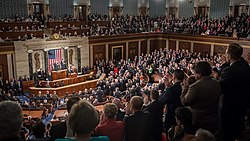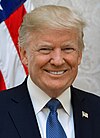2017 Donald Trump speech to a joint session of Congress
| Date | February 28, 2017 |
|---|---|
| Time | 9:00 p.m. EST |
| Duration | 1 hour |
| Venue | House Chamber, United States Capitol |
| Location | Washington, D.C. |
| Coordinates | 38°53′19.8″N 77°00′32.8″W / 38.888833°N 77.009111°WCoordinates: 38°53′19.8″N 77°00′32.8″W / 38.888833°N 77.009111°W |
| Type | Unofficial State of the Union Address |
| Participants | Donald Trump Mike Pence Paul Ryan |


Donald Trump, the 45th president of the United States, addressed a joint session of the United States Congress on Tuesday, February 28, 2017. It was his first public address before a joint session. Similar to a State of the Union Address, it was delivered before the 115th United States Congress in the Chamber of the House of Representatives in the United States Capitol.[6] Presiding over this joint session was the House speaker, Paul Ryan, accompanied by Mike Pence, the vice president in his capacity as the president of the Senate.
During his speech, President Trump announced the creation of the Office of Victims of Immigration Crime Engagement (VOICE) in the United States Department of Homeland Security.[7][8]
Veterans Affairs Secretary David Shulkin was the designated survivor and did not attend the address in order to maintain a continuity of government. He was sequestered at a secret secure location for the duration of the event.
Reception[]
Fact-checkers noted that although Trump's speech to Congress had "fewer untrue statements than many of his remarks",[9] the address nevertheless included numerous false and misleading statements on a variety of issues, including the federal budget, immigration and crime, immigration and the economy, welfare, and the job impact of the Keystone XL and Dakota Access Pipelines.[9][10][11][12][13][14]
The speech[15] was considered more optimistic, conciliatory[16] and politically conventional[14] and "presidential"[17][18] than Trump's typically populist manner of speaking, at a time in which he was receiving historically low approval ratings.[17][19] President Trump’s approval rating was 53% on February 24th 2017, according to Rasmussen Reports - Presidential Daily Poll.
Democratic responses[]
For the Democratic Party, former Kentucky Governor Steve Beshear provided the response; activist Astrid Silva of Nevada offered another response for the party in Spanish.[20] Beshear spoke at a diner in Lexington, Kentucky.[21][22]
Senator Bernie Sanders of Vermont (an independent who caucuses with the Democrats in the Senate) responded to the speech in a 14-minute video posted to Facebook, in which he criticized Trump for failing to make any mention of income inequality, criminal justice reform, or climate change.[23] Sanders also stated: "President Trump once again made it clear he plans on working with Republicans in Congress who want to repeal the Affordable Care Act, throw 20 million Americans off of health insurance, privatize Medicare, make massive cuts in Medicaid, raise the cost of prescription drugs to seniors, eliminate funding for Planned Parenthood, while at the same time, he wants to give another massive tax break to the wealthiest Americans."[23]
According to the Democratic think-tank Center for American Progress, Trump made 51 false or manipulative statements during his speech.[24]
Viewership[]
Trump's speech was aired live on 11 broadcast and cable news networks, and viewed on TV by an estimated 47.7 million people in the United States.[25][26]
Total cable and network viewers[27]
| Network | Viewers |
|---|---|
| FNC | 10,765,000 |
| NBC | 9,144,000 |
| CBS | 7,156,000 |
| ABC | 6,065,000 |
| CNN | 3,944,000 |
| Fox | 3,076,000 |
| MSNBC | 2,683,000 |
Broadcast networks Cable news networks
See also[]
References[]
- ^ The New York Times (February 28, 2017). "President Trump's Address to the Joint Congress (Full Speech)". Retrieved May 10, 2017 – via YouTube.
- ^ NBC News (February 28, 2017). "President Donald Trump's 2017 Joint Address To Congress: Full Speech". Retrieved May 10, 2017 – via YouTube.
- ^ PBS NewsHour (February 28, 2017). "Watch President Trump's full address to a joint session of Congress". Retrieved May 10, 2017 – via YouTube.
- ^ "Full speech: Trump delivers first address to Congress". CNN. February 28, 2017. Retrieved May 10, 2017 – via YouTube.
- ^ CNBC (March 1, 2017). "President Donald J. Trump's Address To A Joint Session Of Congress (Full Speech)". Retrieved May 10, 2017 – via YouTube.
- ^ "Trump to address a joint session of Congress on Feb. 28". Retrieved January 25, 2017.
- ^ Griffin, Andrew (March 1, 2017). "Donald Trump creates Voice agency to publish list of crimes by immigrants". The Independent. Retrieved March 1, 2017.
- ^ "Presidential address: Trump calms tone in first speech to Congress – as it happened". Guardian. February 28, 2017. Retrieved March 1, 2017.
- ^ a b True: Trump's speech included several false or misleading statements, Los Angeles Times (March 1, 2017).
- ^ Glenn Kessler & Michelle Ye Hee, Fact-checking President Trump's address to Congress, Washington Post (February 28, 2017).
- ^ CBS This Morning (March 1, 2017). "How California voters reacted to President Trump's Congress address". Retrieved May 10, 2017 – via YouTube.
- ^ USA Today (March 1, 2017). "Fact-checking Trump's first address to Congress". Retrieved May 10, 2017 – via YouTube.
- ^ The New York Times (March 1, 2017). "Analysis: President Donald Trump's Address to Congress". Retrieved May 10, 2017 – via YouTube.
- ^ a b CBS News (February 28, 2017). "Breaking down President Trump's address to Congress". Retrieved May 10, 2017 – via YouTube.
- ^ "Donald Trump's Congress speech (full text)". CNN. Retrieved May 10, 2017.
- ^ Davis, Julie Hirschfeld; Shear, Michael D.; Baker, Peter (February 28, 2017). "Trump, in Optimistic Address, Asks Congress to End 'Trivial Fights'". The New York Times. Retrieved March 1, 2017.
- ^ a b Thrush, Glenn (March 1, 2017). "5 Key Takeaways From President Trump's Speech". The New York Times. Retrieved March 1, 2017.
- ^ Smith, Alexander; Hanrahan, Mark (March 1, 2017). "Speech hailed as Trump's most presidential moment was "all him": Pence". NBC News. Retrieved March 1, 2017.
- ^ Smith, Lizette Alvarez, Jess Bidgood, Mitch; Tavernise, Sabrina (March 1, 2017). "'Today, He Acted Like a Politician': Voters' Reactions to Trump's Speech". The New York Times. Retrieved March 1, 2017.
- ^ "Democrats Pick Ex-Kentucky Governor To Respond To Trump Speech To Congress". NPR. February 24, 2017. Retrieved February 25, 2017.
- ^ Steve Beshear's full rebuttal to Trump's joint address (video), Washington Post (March 1, 2017).
- ^ Cheryl Truman, Eatery gains world attention hosting Beshear's reply to Trump speech, Lexington Herald-Tribune (March 1, 2017).
- ^ a b Jaclyn Reiss, Bernie Sanders rails against Trump after speech, Boston Globe (March 1, 2017).
- ^ "Trump's Speech to Congress Contained Dozens of Lies, Falsehoods, Inaccurate, or Misleading Statements". thenewcivilrightsmovement.com. Retrieved May 10, 2017.
- ^ Ariens, Chris (March 1, 2017). "Pres. Trump's Address to Congress Watched By 47.7 Million on TV". adweek.com.
- ^ "Nearly 48 Million Americans Watch Pres. Donald Trump's First Address to Congress". www.nielsen.com. March 1, 2017.
- ^ Edelman, Adam (March 1, 2018). "Trump's address to joint session of Congress clocks in at 9 million viewers shy of Obama's 2009 speech". NYDailyNews. Retrieved February 3, 2018.
External links[]
| Wikimedia Commons has media related to Donald Trump speech to joint session of Congress, February 2017. |
| Wikisource has original text related to this article: |
- Remarks by President Trump in Joint Address to Congress at whitehouse.gov
- "Donald Trump's Congress speech (full text)". CNN. Retrieved May 10, 2017.
- About the address at whitehouse.gov
- The Joint Session of Congress. Feb 28, 2017. Washington, DC. on YouTube by The White House
- President Trump Addresses Joint Session Congress on C-SPAN
- Former Kentucky Governor Steve Beshear Delivers Joint Session Democratic Response on C-SPAN
- Former Kentucky Governor Steve Beshear Delivers Joint Session Democratic Response (transcript)
- 115th United States Congress
- 2017 in American politics
- 2017 in Washington, D.C.
- 2017 in the United States
- 2017 speeches
- February 2017 events in the United States
- Presidency of Donald Trump
- Speeches by Donald Trump
- Joint sessions of the United States Congress
- National Special Security Events




